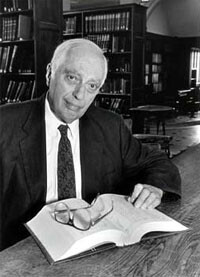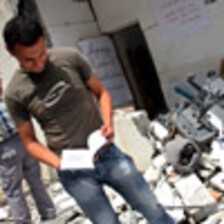The Electronic Intifada 16 December 2002

Above: Bernard Lewis. (Princeton University)
“Bernard Lewis has brilliantly placed the relationships and the issues of the Middle East into their larger context, with truly objective, original — and always independent — thought. Bernard has taught [us] how to understand the complex and important history of the Middle East and use it to guide us where we will go next to build a better world for generations”American Deputy Secretary of Defence Paul Wolfowitz and the rest of the US war hawks are no doubt indebted to the Princeton historian: At the age of 86, Bernard Lewis has not only provided historical justification for Washington’s “war on terror”, but has also emerged as chief ideologue for the recolonisation of the Arab world through an American invasion of Iraq.— Paul Wolfowitz, speaking via video phone at a special ceremony held in Tel Aviv to honour the leading Orientalist in March.
Lewis’s work, especially his book What Went Wrong: Western Impact and Middle Eastern Response, has been a major source in what is practically a manifesto for advocates of US military intervention towards “establishing democracy in the Middle East”. By declaring that the peoples of the Middle East, meaning Arabs and Iranians, have failed to catch up with modernity and have fallen into “a downward spiral of hatred and rage”, Lewis has at once exonerated American imperial policies and provided a moral imperative for President George W Bush’s “preemptive strikes” and “regime change” doctrines.
But the role of the man, who 12 years ago coined the term “clash of civilisations” that was later adopted by Samuel Huntington, has gone beyond that of “an apologist for colonialism”, as Edward Said, his foremost critic, describes him. In fact, Lewis, according to published reports and his own statements, has been involved in lobbying, shaping and promoting the Bush Administration’s most hawkish policies in support of Israel against the Palestinians, and for the aggressive use of American military force in the region.
His influence is not merely a result of his academic stature and prolific writings on Islam, rather it is primarily a function of his membership in an alliance of neo-conservatives and hard-line Zionists who have come to assume key posts in the Bush administration. Led by Defence Secretary Donald Rumsfeld and Wolfowitz, the powerful alliance has been trying to put into practice a vision that they have been advocating throughout the nineties to ensure unrivalled American supremacy through the elimination of all potential threats.
On 19 February 2001, representatives of the alliance, including Lewis, Rumsfeld, Wolfowitz and others, signed a letter urging President Bill Clinton to launch a military offensive, which would have included blanket bombings, to destroy the Iraqi regime. Since assuming power, Rumsfeld and Wolfowitz, have called on influential friends like Lewis, and a host of hard-line pundits, to press for an American war against Iraq.
In that capacity, Lewis has assumed a bigger “insider” role than some officials in the administration who were not included in the decision-making on Iraq. According to a report in USA Today, Lewis participated in a special meeting for the Defence Advisory Board, led by the leader of warmongers, Richard Perle, on 19 September 2001. The meeting that was scheduled before the 11 September attacks had occurred, was also attended by Lewis’s friend Ahmed Chalabi, leader of the Iraqi National Congress. By various accounts, Lewis’s meetings with both President Bush, and especially a dinner with Vice-President Dick Cheney (during his days of seclusion in the immediate aftermath of 9/11), were crucial to promoting Wolfowitz’s agenda of refocusing the administration’s attentions on a war against Iraq.
In those meetings, and many that followed, Lewis argued that 9/11 demonstrated the danger the West was facing, especially if “Muslim terrorists” were supplied weapons of mass destruction by Iraq, Syria or Iran. His message to the administration was that the US could not afford to show weakness towards Arabs and Muslims. An American official told The New Yorker magazine in April that Lewis advised them to disregard warnings against inflaming the so-called Arab street since “in that part of the world, nothing matters more than resolute will and force.”
Lewis often cites the Israeli withdrawal from south Lebanon, which he criticised as “too early”, as an example of such signs of weakness that inspired the Palestinians to emulate Hizbullah’s “perceived victory” by launching the Intifada.
But it is his broad definition of the relationship between Islam and the West that makes Lewis invaluable to the war lobby. Arab and Muslim grievances against the West, in Lewis’s view, are by in large baseless and no more than desperate attempts by failed societies to blame external powers, especially the US and Israel for their self-inflicted misery. Lewis provides “a scholarly” cover for a lobby that has been openly advocating the reshaping of the regional map to eliminate “the Arab threat to Israel”. Furthermore, Lewis considers Israel and Turkey the only real nation states in the region and has been forecasting the demise and the disintegration of Arab states since the Gulf War. “Most of the states of the Middle East… are of recent and artificial construction and are vulnerable to such a process. If the central power is sufficiently weakened, there is no real civil society to hold the polity together, [and] no real sense of common national identity or overriding allegiance to the nation-state. The state then disintegrates — as happened in Lebanon — into a chaos of squabbling, feuding, fighting sects, tribes, regions and parties,” Lewis wrote in Foreign Affairs in 1992.
Lewis has repeatedly cited the rise of Islamism, following the decline of Pan Arabism and socialism, as evidence that all Arab and Muslim responses to Western hegemony — ranging from the Palestinian resistance to intellectual anti-imperialist discourse — result from irrational religious fanaticism.
Lewis seemed to relish the rise of Osama Bin Laden, who he portrayed in a 1998 article as the eloquent and poetic voice of Muslim rage, taking the Islamist’s ascendancy as a vindication of his own inattention to secular and democratic forces in the region who oppose Western domination. In Lewis’s world view, which has been adopted by countless media pundits, only tyrants, oppressors and fanatics would stand up to US plans for radical change in the region, while “true democrats”, like certain figures in the Iraqi opposition, are awaiting military liberation at Washington’s hands.
At the opening of a conference entitled “The Day After: Planning For A Post Saddam Iraq”, organised by the right- wing American Enterprise Institute (AEI), Lewis put forward his views with respect to the current context.
As Lewis sees things, the military campaign is actually a “vision of democratisation” that elicits two types of responses. “The first could be summed up like this: The Arabs are incapable of democratic government. Arabs are different from us, and we must be more, shall we say, reasonable both in what we expect from them and in what they may expect from us. Whatever we do, these countries will be ruled by corrupt tyrants. The aim of foreign policy, therefore, should be to make sure that they are friendly tyrants rather than hostile,” Lewis told the opening session of the conference on 3 October.
“The other point of view is somewhat different. It begins more or less from the same position — that Arab countries are not democracies and that establishing democracies within Arab societies will be difficult. Yet, Arabs are teachable and democratic governance ought to be possible for them, provided we proctor and gradually launch them on our way, or I should say on their way.
“That point of view is known as imperialism. It was the method adopted in the British and French empires, in their mandated territories and in some of their colonies, creating governments in their own image. In Iraq, in Syria, and elsewhere, the British created constitutional monarchies and the French created unstable republics. None of them worked very well. But hope still remains”, Lewis said as he argued for the virtue of American military intervention as an opportunity for the West to modernise the Arab world.
Lewis, who worked for British intelligence during World War II, not only has considerable nostalgia for bygone days, but has put himself solidly in the service of the new American empire, hoping it will pick up where the British and the French left off.
Lamis Andoni is a veteran journalist and analyst who has covered the Middle East for a number of Arab, European,and American newspapers for two decades. This article is based on “The War on Terrorism: The US, Islam and the Arab World”, a course Andoni taught in 2002 at the UC Berkeley Graduate School of Journalism, and first appeared in Issue No. 616 of Al-Ahram Weekly Online, 12-18 December 2002.


